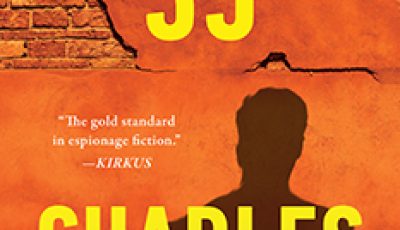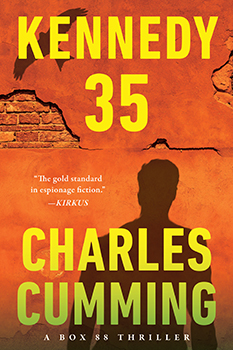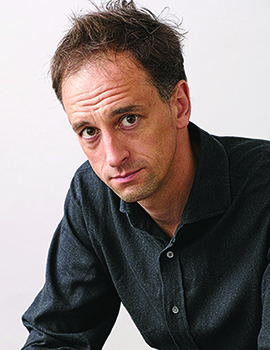

Latest Books Kennedy 35 with Charles Cumming
The Big Thrill Discusses KENNEDY 35 with Charles Cumming
 1995: In the wake of the Rwandan genocide, 24-year-old spy Lachlan Kite and his girlfriend, Martha Raine, are sent to Senegal on the trail of a hunted war criminal. The mission threatens to spiral out of control, forcing Kite to make choices which will have devastating consequences not only for his career at top-secret intelligence agency BOX 88, but also for his relationship with Martha.
1995: In the wake of the Rwandan genocide, 24-year-old spy Lachlan Kite and his girlfriend, Martha Raine, are sent to Senegal on the trail of a hunted war criminal. The mission threatens to spiral out of control, forcing Kite to make choices which will have devastating consequences not only for his career at top-secret intelligence agency BOX 88, but also for his relationship with Martha.
2023: Eric Appiah, an old friend from Kite’s days at school and an off-the-record BOX 88 asset, makes contact with explosive information about what happened all those years ago in West Africa. When tragedy strikes, Kite must use all the resources at his disposal to protect Martha from a criminal network with links to international terror.
Charles Cumming recently sat down with The Big Thrill discussing his newest espionage thriller, KENNEDY 35.
What do you hope readers will take away from this book?
KENNEDY 35 ends on a cliffhanger so I hope readers will be keen to find out what happens next in the BOX 88 spy saga. My expectation is that people will be intrigued by a story set in Senegal; after all, it’s not the first country that springs to mind when you think about spy novels. There is a serious political undercurrent to KENNEDY 35—the Rwandan genocide of 1994—but above all I want readers to enjoy the book as much as they have enjoyed its predecessors.
Was there anything new you discovered, or surprised you, as you wrote this book?
I experienced an enormous slice of good fortune while writing KENNEDY 35. I was struggling to make one of the central characters—a highly intelligent, ruthless Congolese woman—as believable and as compelling as she deserved to be. While on holiday I met somebody who looked and dressed exactly as I had pictured Grace Mavinga in my mind’s eye. Like Grace, she was extremely wealthy, very beautiful and possessed of a charm which had clearly served her well throughout the long course of her life. Not only was she able to tell me where she bought her clothes and shoes, what perfumes she wore and so forth, but we were also able to talk about how she felt as a wealthy black woman living in contemporary London. We became good friends. She told me a great deal about the journey she had taken from the back streets of her home country to the gilded avenues of Knightsbridge.
What authors or books have influenced your career as a writer, and why?
John le Carré has always been a huge influence on my writing. His ability to tell an exciting, page-turning story allied to unrivalled gifts as a prose stylist make him—in my view and in the view of many—the premier spy novelist of all time. Here in the UK we are just finding out details of his extraordinarily exotic and complicated private life which has added another dimension to his reputation!
Without spoilers, are there any genre conventions you wanted to upend or challenge with this book?
I don’t really believe in genre conventions, particularly when it comes to spy fiction. There are very few similarities between, say, the works of Robert Ludlum and John le Carré or novels by Eric Ambler and Mick Herron. Some thrillers set out simply to thrill—to deliver a sugar rush of excitement with scant attention paid to believability or psychological realism. Others are closer in mood to what the publishing industry likes to call ‘literary fiction.’ Having said that, the two timelines in the BOX 88 series are, I think, unique in the genre. Readers can follow the adventures of the hero, Lachlan Kite, as a young spy in the 1990s and also as a married man in middle-age running the agency from its headquarters in London. This allows me to show not only how Kite has changed as a character over the course of three decades but also how the business of spying has been shaped not only by political events but also radically changed by technology.
Which took shape first: plot, character, or setting?
Setting. I had a picture in my mind of Lachlan Kite and his girlfriend, Martha Raine, sitting on a beach in West Africa in 1995. The entire story—both the flashback to Senegal and the contemporary scenes in London, New York and Mauritius—grew from that single mental image.
What was the biggest challenge this book presented? What about the biggest opportunity?
My sister died suddenly while I was writing KENNEDY 35. As you can perhaps imagine, that made the business of finishing the novel enormously difficult and complicated. The book is dedicated to her memory.
Charles Cumming is a British writer of spy fiction. He was educated at Eton College (1985-1989) and the University of Edinburgh (1990-1994), where he graduated with 1st Class Honors in English Literature. He’s been described him as “the best of the new generation of British spy writers who are taking over where John le Carré and Len Deighton left off.”
To learn more about the author and his work, please visit his website.
KENNEDY 35 with Charles Cumming
- AudioFile Spotlight: March Mystery and Suspense Audiobooks - March 17, 2025
- Africa Scene: Shadow City by Natalie Conyer - March 17, 2025
- The Ballad of the Great Value Boys by Ken Harris - February 15, 2025

